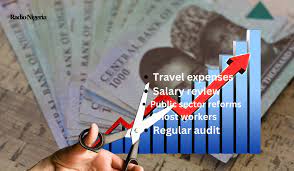The cost of governance in Nigeria remains one of the highest in the world, consuming a disproportionate share of national revenue and leaving limited resources for critical development projects. With dwindling oil revenues, rising debt levels, and persistent budget deficits, reducing the cost of governance is no longer an option but an urgent necessity. The federal, state and local governments must take decisive steps to streamline public spending, eliminate waste, and ensure that governance serves the people rather than political elites.
A major contributor to Nigeria’s high governance costs is the bloated structure of government. With 36 states, 774 local governments, numerous ministries, departments, and agencies (MDAs), and a large political officeholder base, public funds are overstretched to maintain an expensive bureaucracy. A critical step towards cost reduction is restructuring government agencies to eliminate duplication of roles. The implementation of the Oronsaye Report, which recommended merging, scrapping, and restructuring many MDAs, remains a viable blueprint for reform. By reducing redundant agencies and cutting down excessive administrative overheads, the government can save billions of naira annually.
Another area of concern is the high cost of political office maintenance. Lawmakers, ministers, and other public officials enjoy lavish salaries, allowances, and perks, which are often at odds with Nigeria’s economic realities. A review of these benefits, in line with global best practices, is necessary to align political spending with national economic conditions. Countries with more efficient governance structures operate with fewer resources, proving that the same can be achieved in Nigeria. The Revenue Mobilization, Allocation and Fiscal Commission (RMAFC) must ensure that public officeholders’ earnings reflect the country’s financial state.
Corruption and financial leakages further compound governance costs, as funds meant for infrastructure, healthcare, and education are often diverted into private pockets. Strengthening anti-corruption institutions such as the Economic and Financial Crimes Commission (EFCC) and the Independent Corrupt Practices and Other Related Offences Commission (ICPC) will ensure that government expenditures are transparent and accountable. The use of technology to monitor public spending, such as the Government Integrated Financial Management Information System (GIFMIS), should be expanded to minimize corruption risks.
The government must also reconsider its approach to recurrent versus capital expenditure. A large portion of Nigeria’s budget is allocated to salaries, travel allowances, and official entertainment, while capital projects that directly impact citizens, such as roads, schools, and hospitals, receive inadequate funding. A deliberate shift toward capital expenditure will create jobs, stimulate economic growth, and ensure that public resources yield tangible benefits for the populace.
Cost-cutting should extend to the subnational level, as state and local governments contribute significantly to excessive governance expenses. Many states rely heavily on federal allocations while running inefficient bureaucracies that add little value to economic development. Fiscal responsibility laws should be strengthened to compel states to adopt lean governance structures, prioritize internally generated revenue, and reduce dependency on federal disbursements.
A strong political will is required to implement these reforms. Many previous efforts to reduce governance costs have been resisted by those benefiting from the current system. However, with increasing public debt and economic hardships, the government can no longer afford excessive spending. By implementing structural reforms, reducing waste, and fostering accountability, Nigeria can redirect its resources toward development and create a more efficient, transparent, and citizen-centered governance system.





